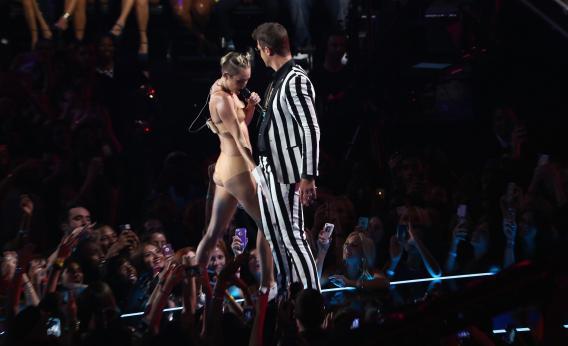America has spoken and it appears we will be thoroughly and obsessively hashing over Miley Cyrus’s awkward performance at the MTV Video Music Awards. Some of the commentary has been genuinely interesting, but most of it has been the same old sex panic that comes up every time America is rudely reminded that little girls grow up into women who like dirty, nasty sex. And now the responsibility for the millennia-old problem of grown men raping young girls has been laid at the feet of 20-year-old Miley Cyrus.
Joanne Bamberger, writing for USA Today, claims she was ready to take my advice and blow off Cyrus’ performance, but then was compelled to pay attention after learning of the horrible story of the adult man who was sentenced to only 31 days in jail for raping a 14-year-old girl:
According to Yellowstone County District Judge G. Todd Baugh, he didn’t impose a harsher sentence on Morales’ rapist because she “seemed older than her chronological age” and he believed she was “as much in control of the situation” as her attacker. Morales later committed suicide just before her 17th birthday.
So how is this Cyrus’ fault, exactly?
Even though she is 20, many of us still see her as the tween/teen star of Disney’s Hannah Montana, and maintain a mental image of her as that more wholesome child, even as she struts on stage today, inviting sexual attention. Shows like 16 and Pregnant reinforce the idea that girls are sexually mature before they graduate from high school. The music industry inundates us with salacious female images, like the Britney Spears/Madonna French-kissing episode ten years ago on same MTV award show.
Even outlets like the New York Times have responsibility for a growing cultural view that girls entice inappropriate sexual advances. One 2011 article about an 11-year-old girl who was gang-raped in a small Texas town suggested that she provoked the attack by her provocative attire.
Indeed, that New York Times article was much like Bamberger’s, in that it made a false equivalence between inviting sexual attention and inviting criminal assault. Look, teenage girls are going to experiment with trying on a bunch of sexual persona to figure out what works for them. It’s the sexual equivalent of trying out a bunch of sports and other hobbies to see what kind of person you want to grow up to be. Even those girls who do consort with grown men aren’t doing so because Cyrus had the nerve to stop acting like she was 12 years old. As Emily McCombs at XO Jane explains in painful detail, it’s because they are being manipulated by abusive rapists who use their victims’ need for approval and yes, even love, as weapons against them, in the same way other rapists use fists or threats.
As Bamberger notes, a huge percentage of rape victims, about one-third, are under 17 at the time of the crime. The reason for this isn’t because teenage girls are awkwardly trying to see if they can work a miniskirt or are imitating their favorite pop stars’ sexualized dance moves. It is because younger women are more pliable and therefore more easily victimized. The reason that other adults, such as Judge Baugh, make excuses for men raping them is in no small part because of op-eds like Bamberger’s, which shift the responsibility for rape off the shoulders of men who do it and onto the shoulders of girls and women who are blamed for being too, in Bamberger’s words, “sexually mature.”
Bamberger’s piece also brings up the uncomfortable question of the role that rape victims who are over 18 play in all this. If, as she argues, “it doesn’t seem to be a huge leap to suggest that as adults become accustomed to seeing young girls increasingly sexualized in the media, that teen victims of sexual assault will be judged more harshly and be held to an impossible standard of being ‘in control,’ ” then what of women who are “sexualized” by being actual grown adults, most of whom have had consensual sex and can’t make claims of pure, virginal innocence under any circumstances? Should we just give up on them? Is it really inevitable that victims of sexual assault will have to be judged as less worthy of justice because they have engaged in behaviors marked “sexualized”? I have a countersolution: Let’s hold rapists accountable for raping, and drive home the message that just because someone invites attention doesn’t mean she invites rape.
